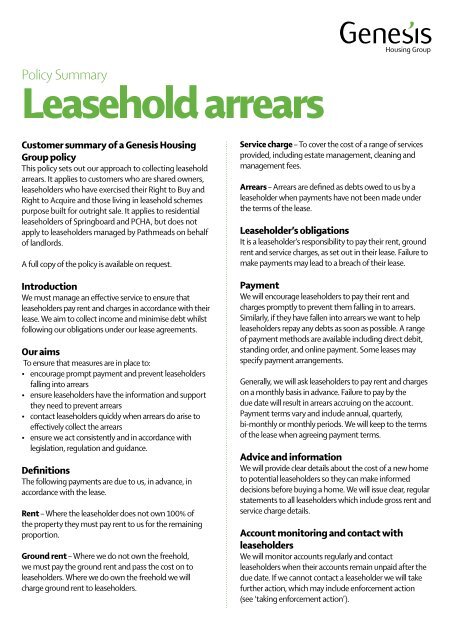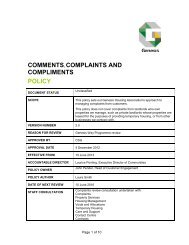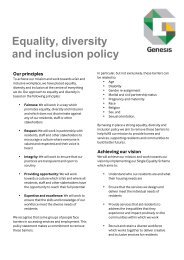Leasehold arrears - Genesis Housing Association
Leasehold arrears - Genesis Housing Association
Leasehold arrears - Genesis Housing Association
You also want an ePaper? Increase the reach of your titles
YUMPU automatically turns print PDFs into web optimized ePapers that Google loves.
Policy Summary<br />
<strong>Leasehold</strong> <strong>arrears</strong><br />
Customer summary of a <strong>Genesis</strong> <strong>Housing</strong><br />
Group policy<br />
This policy sets out our approach to collecting leasehold<br />
<strong>arrears</strong>. It applies to customers who are shared owners,<br />
leaseholders who have exercised their Right to Buy and<br />
Right to Acquire and those living in leasehold schemes<br />
purpose built for outright sale. It applies to residential<br />
leaseholders of Springboard and PCHA, but does not<br />
apply to leaseholders managed by Pathmeads on behalf<br />
of landlords.<br />
A full copy of the policy is available on request.<br />
Introduction<br />
We must manage an effective service to ensure that<br />
leaseholders pay rent and charges in accordance with their<br />
lease. We aim to collect income and minimise debt whilst<br />
following our obligations under our lease agreements.<br />
Our aims<br />
To ensure that measures are in place to:<br />
• encourage prompt payment and prevent leaseholders<br />
falling into <strong>arrears</strong><br />
• ensure leaseholders have the information and support<br />
they need to prevent <strong>arrears</strong><br />
• contact leaseholders quickly when <strong>arrears</strong> do arise to<br />
effectively collect the <strong>arrears</strong><br />
• ensure we act consistently and in accordance with<br />
legislation, regulation and guidance.<br />
Definitions<br />
The following payments are due to us, in advance, in<br />
accordance with the lease.<br />
Rent – Where the leaseholder does not own 100% of<br />
the property they must pay rent to us for the remaining<br />
proportion.<br />
Ground rent – Where we do not own the freehold,<br />
we must pay the ground rent and pass the cost on to<br />
leaseholders. Where we do own the freehold we will<br />
charge ground rent to leaseholders.<br />
Service charge – To cover the cost of a range of services<br />
provided, including estate management, cleaning and<br />
management fees.<br />
Arrears – Arrears are defined as debts owed to us by a<br />
leaseholder when payments have not been made under<br />
the terms of the lease.<br />
<strong>Leasehold</strong>er’s obligations<br />
It is a leaseholder’s responsibility to pay their rent, ground<br />
rent and service charges, as set out in their lease. Failure to<br />
make payments may lead to a breach of their lease.<br />
Payment<br />
We will encourage leaseholders to pay their rent and<br />
charges promptly to prevent them falling in to <strong>arrears</strong>.<br />
Similarly, if they have fallen into <strong>arrears</strong> we want to help<br />
leaseholders repay any debts as soon as possible. A range<br />
of payment methods are available including direct debit,<br />
standing order, and online payment. Some leases may<br />
specify payment arrangements.<br />
Generally, we will ask leaseholders to pay rent and charges<br />
on a monthly basis in advance. Failure to pay by the<br />
due date will result in <strong>arrears</strong> accruing on the account.<br />
Payment terms vary and include annual, quarterly,<br />
bi-monthly or monthly periods. We will keep to the terms<br />
of the lease when agreeing payment terms.<br />
Advice and information<br />
We will provide clear details about the cost of a new home<br />
to potential leaseholders so they can make informed<br />
decisions before buying a home. We will issue clear, regular<br />
statements to all leaseholders which include gross rent and<br />
service charge details.<br />
Account monitoring and contact with<br />
leaseholders<br />
We will monitor accounts regularly and contact<br />
leaseholders when their accounts remain unpaid after the<br />
due date. If we cannot contact a leaseholder we will take<br />
further action, which may include enforcement action<br />
(see ‘taking enforcement action’).
We will contact leaseholders in writing, over the telephone<br />
or in person where necessary. We aim to let leaseholders<br />
know that they have <strong>arrears</strong>, encourage them to repay<br />
the debt and advise them of any action we may take to<br />
recover the debt. We will record all communication and<br />
correspondence with leaseholders regarding their <strong>arrears</strong>.<br />
Difficulties in paying rent and charges<br />
Where a leaseholder finds it difficult to pay we will make<br />
arrangements for them to clear <strong>arrears</strong> over an agreed<br />
period of time, usually between three and six months. We<br />
will agree reasonable and affordable payment plans and<br />
confirm them in writing. Any payment plan will take into<br />
account our need to collect enough service charges in to<br />
the service charge account and reserve funds to pay for<br />
works such as lift maintenance or roof repairs. Where the<br />
lease allows, we will charge interest on the debt.<br />
We will advise leaseholders to seek debt advice from<br />
independent agencies such as Citizens’ Advice Bureau.<br />
These agencies may also help with claims for welfare<br />
benefits, including <strong>Housing</strong> Benefit.<br />
Loan facilities<br />
Some leaseholders may have a statutory right to a loan<br />
facility for help in paying service charges. In these cases, we<br />
will process applications in accordance with regulations.<br />
Taking enforcement action<br />
Where a leaseholder does not keep to a payment<br />
arrangement or fails to contact us to resolve their <strong>arrears</strong><br />
we will take one or more of the following enforcement<br />
options to recover the debt:<br />
• contacting the mortgage lender<br />
• civil action, such as a small claims action or a county<br />
court judgement<br />
• possession action (shared owners only)<br />
• forfeiture.<br />
Forfeiture<br />
We will only seek forfeiture of the lease for <strong>arrears</strong> as a<br />
matter of last resort. Before taking court action, we will<br />
always tell the leaseholder of our intention by serving a<br />
notice under section 146 of the Law of Property Act 1925.<br />
We will also tell the mortgage lender.<br />
We will not start forfeiture proceedings if the amount of<br />
debt is less than £350 or has been outstanding for more<br />
than three years. This is in line with leasehold law. As part<br />
of the forfeiture process, we will make an application to<br />
the <strong>Leasehold</strong> Valuation Tribunal (LVT) asking them to<br />
confirm that the leaseholder has breached their lease.<br />
We will add any court fees and legal costs relating to the<br />
forfeiture to the <strong>arrears</strong>.<br />
Before we take any legal action, we will check whether<br />
the leaseholder requires any support and refer them to<br />
relevant support agencies if it’s necessary.<br />
Possession and resale of a property<br />
Where the court has granted forfeiture of the lease, we will<br />
tell the leaseholder of the decision and instruct the bailiff<br />
to gain possession.<br />
Where we have a commitment to sell shared ownership<br />
properties, we will pass them back to <strong>Genesis</strong>homes to<br />
market and re-sell the property in line with the local<br />
eligibility criteria. Where 100% of the property was<br />
owned by the leaseholder, the property will be sold on<br />
the open market.<br />
Once the property is sold, we will deduct any relevant<br />
expenses from the proceeds of the sale; for example<br />
outstanding service charges and legal fees. If there is not<br />
enough money left after the sale to cover the costs, we<br />
may make a claim to the court. If there is money left after<br />
the sale we will usually return it to the former leaseholder.<br />
Arrears following the death of a leaseholder<br />
In cases where a leaseholder in a retirement flat has<br />
died, we may agree to defer payments of charges. Any<br />
agreements will be made at our discretion and will not<br />
affect our right to take action in line with the lease.<br />
Confidentiality<br />
All office interviews regarding <strong>arrears</strong> will be carried out<br />
in confidence. The details of a leaseholder’s account will<br />
not be shared with anyone outside <strong>Genesis</strong> <strong>Housing</strong><br />
Group without the leaseholder’s written permission.<br />
When dealing with a phone query, we will not disclose<br />
personal information without first confirming the<br />
customer’s identity.<br />
Staff training<br />
We will train staff in a range of areas so that we<br />
effectively manage leasehold <strong>arrears</strong>. These areas<br />
including legal framework for debt recovery, welfare<br />
benefit regulations, approaches to debt recovery and<br />
service charge management.<br />
Performance monitoring<br />
We will set, monitor and review appropriate performance<br />
targets for leasehold income collection and <strong>arrears</strong><br />
management.
Contact us<br />
If you would like a copy of the full policy please contact the<br />
Policy Team on 020 8150 4112 or email info@ghg.org.uk<br />
If you are a PCHA customer phone us<br />
on 020 8451 8000<br />
or email info@pcha.org.uk<br />
www.pcha.org.uk<br />
If you are a Springboard <strong>Housing</strong><br />
<strong>Association</strong> customer phone us<br />
on 020 8475 0033<br />
or email info@springboardha.org.uk<br />
www.springboardha.org.uk<br />
If you need any part of this<br />
information in large print, Braille,<br />
on audio tape or explained in your<br />
own language please contact us<br />
on the number below.<br />
Bengali<br />
Portugese<br />
Company number 3802456. <strong>Housing</strong> Corporation Number L4286. Registered Office: Capital House, 25 Chapel Street, London NW1 5DT<br />
Spanish<br />
French<br />
Somali<br />
Arabic<br />
Gujarati<br />
Telephone 020 7563 0037<br />
or email info@ghg.org.uk<br />
GHG1179_LEASHOLD ARREARS






